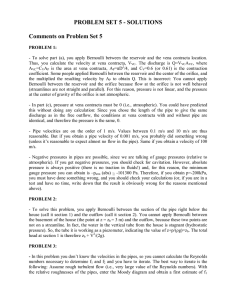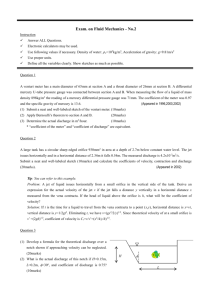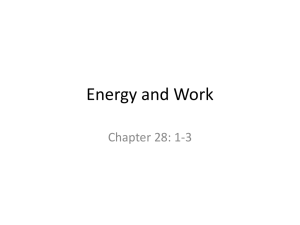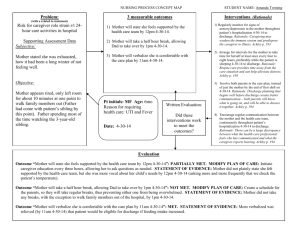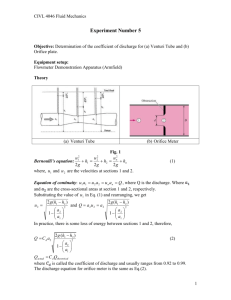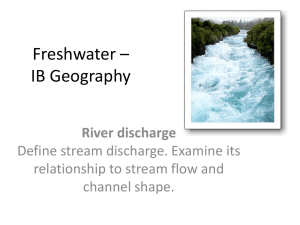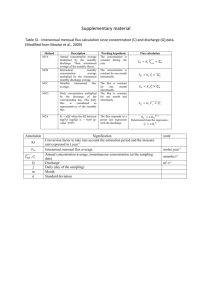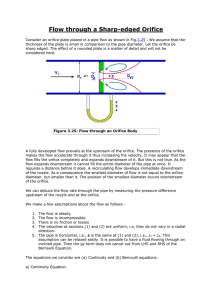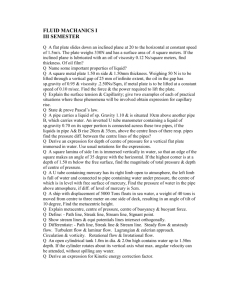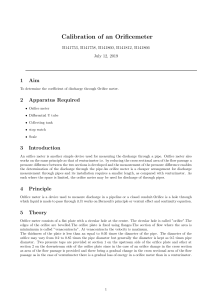Exercices Lecture 8
advertisement
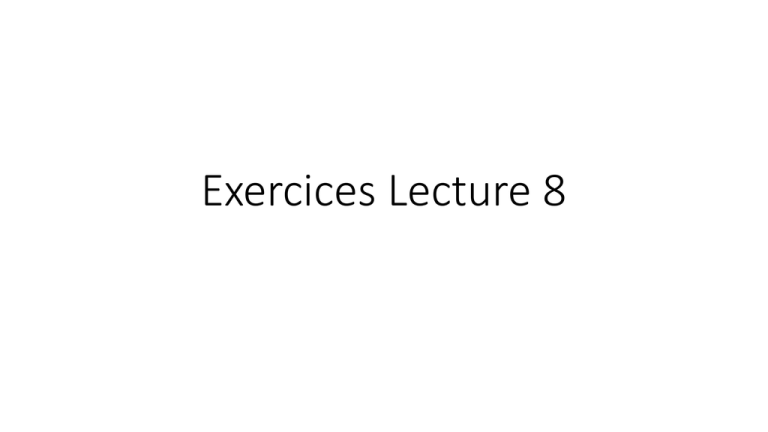
Exercices Lecture 8 • The boat is moving and consequently the control volume must be moving with it. • The flow entering into the control volume is the flow passing by the engine (the pump). In a relative reference this flow is entering with the speed of the boat and is leaving with the speed of the jet. V Q j kV V V Q Q 2 4k V jQ 2 2k Q 2k 2 V jQ k 2 V Q V j Q 0 Units of k? 2k Q V Q F kV k V Q V 2 V AV V 2 A Rationale: • Momentum flux variation balances applied forces; • Mass is conserved; • Energy is not conserved: Bernoulli equation is not applicable. 2 D1 U1 4 2 D 2 U2 4 Q The pressure is assumed uniform at the entrance, both on the wall and in the open section. D1 2 U 2 U1 D2 2 U 2 Q U 1 Q PA n 1 PA n 2 2 2 D1 D1 U 1 2 U 1 4 D2 P1 P1 P2 D 2 2 2 D1 U 1 U 1 4 2 D 2 P1 P2 4 2 2 D 2 1 D1 U 1 1 2 D2 P2 U 1 2 2 2 D1 D1 A1 2 A1 1 U 1 1 2 2 A2 A 2 D2 D2 Rationale: • Mass is conserved; • Momentum flux changes balances the applied force. • There is no momentum flux change and thus the forces balance 2 D1 U1 4 2 D 2 U2 4 U1 U 2 U 2 Q U 1 Q PA n 1 PA n 2 F F P1 P2 D 4 2 145 * 10 * 3 0 .1 4 2 1 . 14 * 10 N 114 kg 3 Are data of exercise P3.85 plausible? Rationale: • Between the orifice (section O) and section 2 one can apply the same rationale as in P3.59 • Between section 1 and the orifice the figure suggests that there are no eddies and thus no energy dissipation and consequently the Bernoulli Equation could be applied. • We can thus relate the pressure at section 1 and section 2 combining a energy budget between 1 and O and a momentum budget between O and 2. 2 DO UO 4 2 D 2 U2 4 Q D2 2 UO U2 DO 2 U 2 Q U O Q PA n O PA n 2 PO P2 2 D 2 2 U 2 1 2 DO 1 1 2 2 U P U P 2 2 1 O PO P1 P1 1 2 U 2 1 U 2 O 4 2 D 1 A1 1 2 P1 U 1 2 P1 U 1 1 2 2 D A O O 1 2 1 P2 P1 PO PO P2 4 D 1 D 1 2 2 U 2 1 U 1 1 2 D D O 2 2 2 O P1 P2 4 2 D 1 D 2 2 1 1 U 2 1 2 D 2 D O O 500 gal / min 0 . 0315 m 3 / s U 4m / s D2 2 D 2 . 78 2 O D1 D O P1 4 7 . 72 1 3 2 1 7 . 72 82 KPa P2 10 * 4 * 1 2 . 78 2 This is about one half of the pressure drop suggested in the text of the exercise. Two hypotheses can be considered: 1) The data is wrong. 2) The data is ok and the stream lines are not well represented. If they were as represented in the Figure, then the effective orifice diameter is smaller than that considered in the problem (there is a vena contracta) Could we calculate the flow discharge using the diaphragm of P3.85 and measuring the pressure drop between entrance and the orifice? 1 1 2 2 U P U P 2 2 1 O PO P1 U Yes, we could, but if there is a vena contracta one will get an excessive discharge because the real pressure drop is higher than that assumed in this calculation. The discharge computed using this equation is called the ideal discharge. The real discharge is this multiplied by a coefficient smaller than unity. Q 1 2 U P1 2 1 U 2 O 2 A1 P1 U 1 2 2 AO PO 4 1 D1 1 2 D O D 4 P1 2 PO 4 D 1 1 2 D O 1 1 2 1
